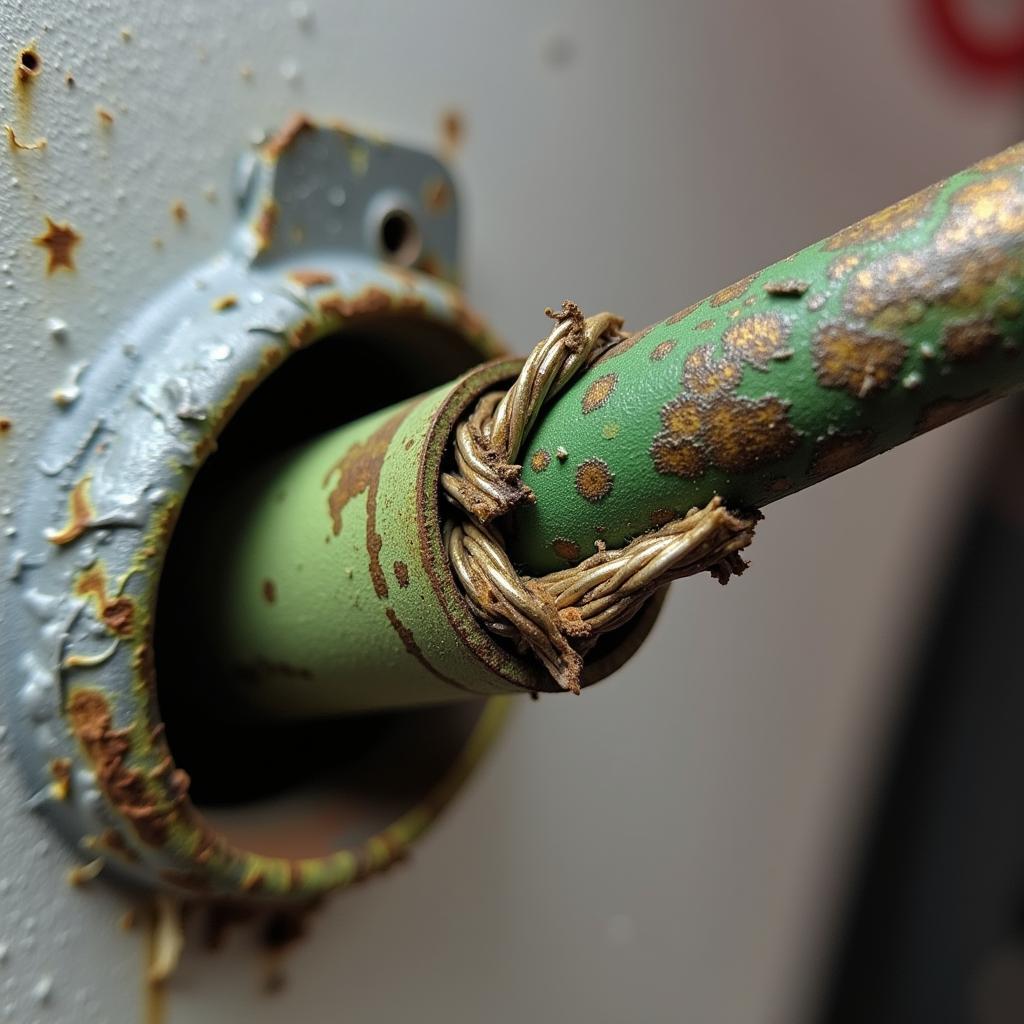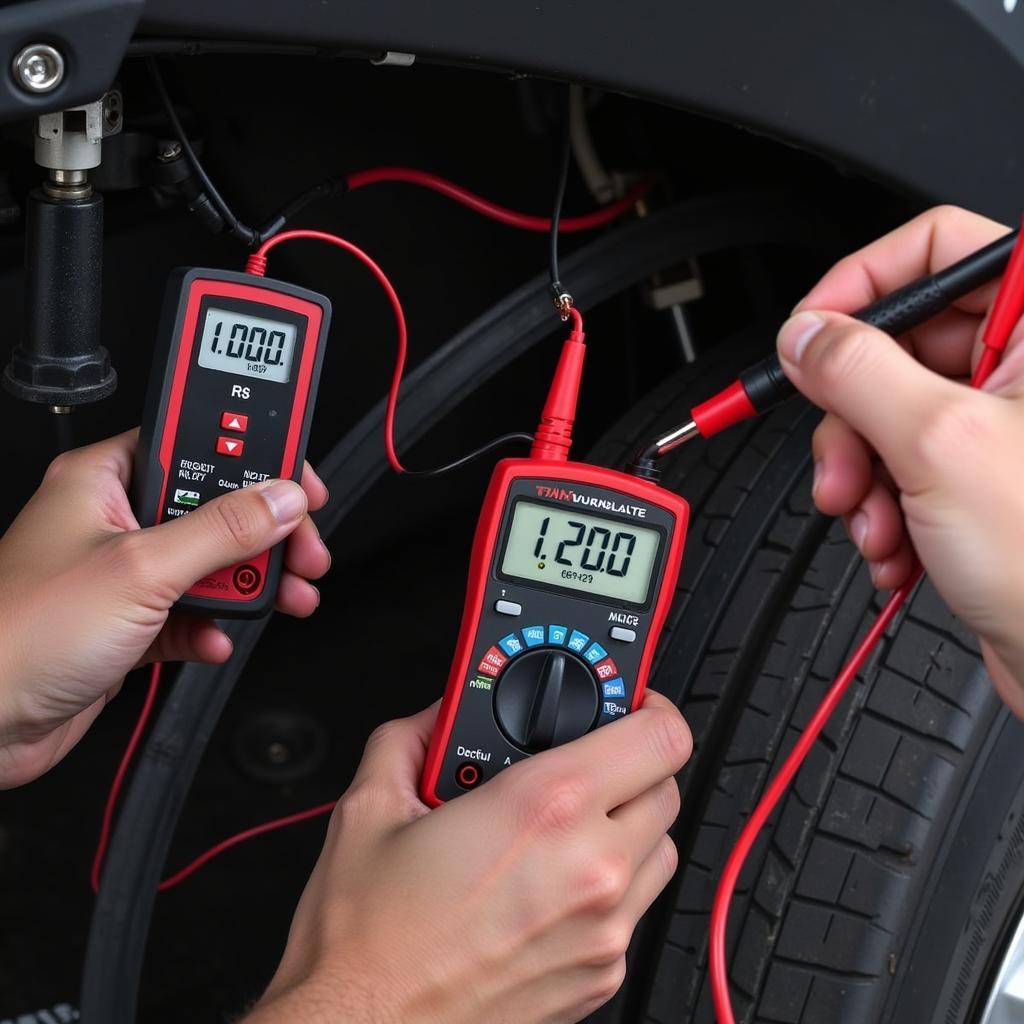Car Ground Wire Problems can be a real headache, causing a variety of electrical issues that can leave you stranded. Understanding how to diagnose and fix these problems is essential for any car owner or mechanic. This article provides a comprehensive guide to troubleshooting and resolving car ground wire issues.
 Car Ground Wire Corrosion
Car Ground Wire Corrosion
Many electrical systems in modern vehicles rely on a properly functioning ground circuit. A faulty ground wire can lead to dim or flickering lights, malfunctioning accessories, and even starting problems. Identifying the source of the problem can be challenging, but with a systematic approach, you can effectively diagnose and fix car ground wire problems. ground wire causing car problems provides some initial insight into the issues a bad ground can cause. But let’s dive deeper.
Understanding the Importance of Car Ground Wires
The ground wire completes the electrical circuit, allowing current to flow back to the battery’s negative terminal. It’s like the return path on a highway – essential for smooth traffic flow. Without a solid ground connection, the electrical components cannot receive the necessary current to function correctly.
Why Do Ground Wires Fail?
Several factors can contribute to ground wire failure, including:
- Corrosion: Exposure to moisture, road salt, and chemicals can corrode the ground wire, disrupting the electrical connection.
- Loose Connections: Vibrations and normal wear and tear can loosen ground connections over time.
- Physical Damage: Accidents or improper repairs can damage the ground wire, leading to electrical issues.
How to Find a Ground Problem in a Car
Diagnosing car ground wire problems requires a methodical approach. how to find a ground problem in a car offers helpful tips on this process. A few key steps include:
- Visual Inspection: Carefully examine the ground wires for signs of corrosion, damage, or loose connections. Look for green or white powdery residue, frayed wires, or loose terminals.
- Voltage Drop Test: Use a multimeter to measure the voltage drop across the ground wire. A high voltage drop indicates a problem with the ground connection.
- Continuity Test: This test checks for a complete electrical path between the component and the battery’s negative terminal. A lack of continuity indicates a broken or corroded ground wire.
 Multimeter Testing Car Ground
Multimeter Testing Car Ground
“A good ground is the foundation of any reliable electrical system,” says John Miller, a veteran automotive electrician with over 25 years of experience. “Neglecting ground wire maintenance can lead to a cascade of electrical problems down the line.”
Fixing Car Ground Wire Problems
Once you’ve identified the faulty ground wire, you can take steps to fix the issue.
- Cleaning Corroded Connections: Use a wire brush and a corrosion removal solution to clean the affected areas.
- Tightening Loose Connections: Ensure all ground connections are tight and secure.
- Replacing Damaged Wires: If the wire is damaged, replace it with a new wire of the same gauge.
Preventing Car Ground Wire Problems
ground wire car problems can be largely avoided with proper maintenance. Regular inspection and cleaning of ground connections can prevent corrosion and ensure a reliable electrical system. Applying a dielectric grease to the connections can also help protect them from moisture and corrosion.
“Preventative maintenance is key,” advises Susan Davis, an automotive engineer with over 15 years of experience in vehicle electrical systems. “Regularly checking and cleaning ground connections can save you time and money in the long run.”
Conclusion
Car ground wire problems can be frustrating, but with a little knowledge and effort, you can effectively diagnose and fix them. By understanding the importance of ground wires and implementing preventative maintenance, you can keep your car’s electrical system running smoothly. For further assistance with car audio or other electrical issues like sony car stereo power problem or even seemingly unrelated issues like 2003 lincoln town car fuel gauge problems, feel free to contact AutoTipPro at +1 (641) 206-8880 or visit our office located at 500 N St Mary’s St, San Antonio, TX 78205, United States. We are here to help!





Leave a Reply